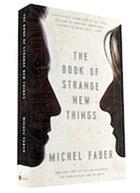
The Book of Strange New Things is a major work by an author who never repeats himself but continues to push the limits of cutting-edge literature. Michel Faber's novel about the spreading of the gospel in an alien world, and the possible end of our world, is also an exploration of a marriage in crisis and how faith and fidelity are tested in extremis.
Peter Leigh is a missionary recruited by the vaguely sinister multi-national corporation USIC to preach to the inhabitants of the recently discovered planet Oasis, lightyears away. Peter's wife, Bea, is left back on Earth--deemed unfit for the mission by USIC--where the situation becomes increasingly desperate, possibly apocalyptic. Bea's faith is being shaken while Peter is moving in the other direction with great success and emotional epiphanies in his evangelization of the Oasans. USIC's awareness of the Earth's precarious position adds a paranoid, Orwellian aspect to the novel.
Peter and Bea's solid, loving relationship is reduced to fumbling, intermittent communications on "the Shoot," a device that sends typewritten notes across the galactic distance, as the couple try to share diametrically opposed experiences--Peter reaching almost transcendent moments of euphoria with his Jesus-loving alien brethren; Bea, increasingly desperate and isolated back home as the world suffers a series of unprecendented natural disasters. Faber manages to convey the emotional rawness and sense of how a few wrong words can send a relationship hurtling into dangerous realms.
Faber, the author of the acclaimed Under the Skin and The Crimson Petal and the White, moves into new territory (literally) with The Book of Strange New Things. The speculative aspects of his novel are seamless, intriguing, thought-provoking and ultimately shocking. The Oasans are a fully realized species, and very other: "Here was a face that was nothing like a Face. Instead, it was a massive whitish-pink walnut kernel." They speak a limited English, with a soft, asthmatic sound-- "Where the 's's should have been, there was a noise like a ripe fruit being thumbed into two halves."--and Faber uses symbols to substitute for some common sounds. His description of the planet and its ecosystems have that touch of the odd and sublime that marks a great work of science fiction--on Oasis, even the rain is different: "They truly were rains, plural. Three colossal networks of water were advancing independently, separated by substantial spaces of clear air. Each network had its own internal logic, replicating and reassembling its glittering patterns over and over." The Oasans--already familiar with Christianity via a previous preacher who went missing--call the book Peter shares with them "The Book of Strange New Things."They never say the word "Bible," because " 'Power of the book forbid. Flame give warmth....' With outstretched hands, [the Oasan] mimed the action of warming oneself on a fire, getting too close and being burned." But they are eager to hear the "technique of Jesus." Why they are so keen, even desperate, is one of the surprises Faber has in store.
Faber describes Peter's interactions with his fellow USIC contractors who've been gathered at the utilitarian base, a group of odds and sods nearly as frustratingly opaque to him as the indigenous population. In particular, Peter develops a relationship with Grainger, a woman with seemingly no use for his faith, who has her own unresolved issues on Earth.
Faber manages to weave echoes of imperialism and "white man's burden" into the narrative without making Peter into a straw man of an over-zealous evangelist. Peter remains compassionate though naïve; he can misread situations, whether with his wife or the gentle Oasans to whom he ministers. Faber has given him the back-story of a bruiser and addict whose salvation came through Bea and her faith; it is one of the ambiguities of the novel that the reader wonders how much of his faith is rooted in wanting to please her and how much will remain of it if her faith is lost to her.
Bea's narrative of her domestic Armageddon is harrowing. The breakdown of Earth's infrastructure and the daily amenities that have become necessities are presented with clinical horror and compassionate skill. In Faber's version, the world will end with a bang and a whimper. Peter, increasingly absorbed in his alien world, is helpless in the face of Bea's increasingly dire situation.
Faber presents complex ideas and grand themes here with penetrating insight and he never once loses track of the story or lets it bog down in narrative detail. There are moments in this novel of such devastating truth that they are capable of wiping away old world views, scenes of such revelatory power and tenderness that they will stay with the reader for a long time.
The Book of Strange New Things is an unsettling, thought-provoking exploration of faith, love and redemption, deserving of a wide audience. --Donald Powell

